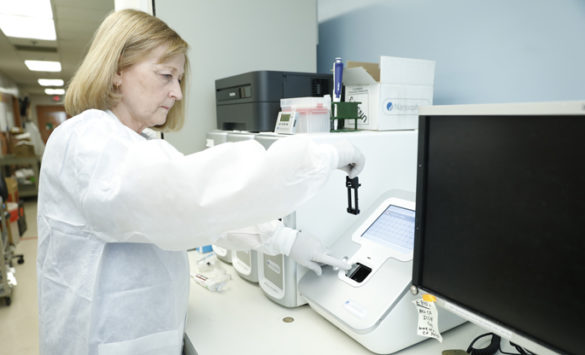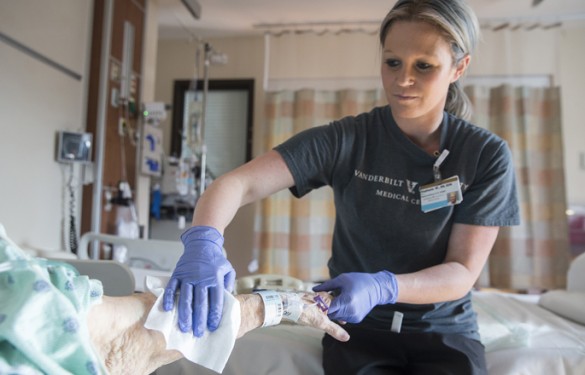
Last month, Vanderbilt Clinical Laboratories introduced rapid molecular diagnostic testing to more quickly identify microorganisms that may be causing a patient’s bloodstream infection, along with the organism’s susceptibility to drugs.
“This will help get patients with bloodstream infections out of the hospital sooner. It will get them the best treatment quicker. It will reduce exposure to unnecessary antibiotics and thus to unnecessary adverse events,” said infectious diseases specialist George Nelson, M.D., assistant professor of Medicine and director of the Antimicrobial Stewardship Program (VASP) at Vanderbilt University Adult Hospital.
When a patient has a bloodstream infection, in most cases a blood culture will test positive within 12 to 48 hours. For all positive blood cultures, further testing is undertaken to identify the organism and its drug susceptibility. 
This further testing takes two to three days and involves exposing the cultured organism to multiple drug compounds, to see which ones might be effective.
When a blood culture is positive for infection, with the new test the additional time needed to identify the organism and determine its drug susceptibility is shortened from two to three days to just two-and-a-half hours.
All Vanderbilt patients who test positive for bloodstream infection automatically receive the new test.
Vigilance regarding bloodstream infection helps patient care teams head off immune responses that can develop into sepsis.
According to the National Institutes of Health (NIH), sepsis affects more than 1 million people per year in the U.S., leading to death in 28 to 50 percent of all cases.
Multidrug-resistant microorganisms are becoming more prevalent, outpacing drug development. If a patient is very ill, until what’s driving the bloodstream infection can be determined, clinicians are prone to use more potent antibiotics.
Over-treating bloodstream infections — using big-gun, broad-spectrum antibiotics when little-gun, narrow-spectrum antibiotics would work just as well — has two significant drawbacks: it exposes patients to side effects unnecessarily, and it spurs antibiotic resistance.

“Until that final testing is complete, you’re making an educated guess, but essentially shooting in the dark. And your patient may not be doing well on therapy, so while waiting for the results you’ll be switching therapies, which is more of an art than a science,” said infectious diseases specialist Matthew Greene, M.D., assistant professor of Medicine.
There are competing devices for rapid diagnostic testing of positive blood cultures. Vanderbilt selected a product called Verigene, marketed by Luminex Corp.
Once a blood culture turns positive, using DNA analysis, in two-and-a-half hours Verigene provides preliminary identification for most invading organisms and forecasts which drugs are apt to work.
“The whole beauty of this rapid information is that you can say ‘we know what to move on,’” said Greene, who has provided presentations about Verigene to practice groups across Vanderbilt University Medical Center.
“The information you’re getting from Verigene is not complete, but I think of it as giving you a pretty reliable warning shot for resistant bacteria, giving you a major head start.
“Timeliness in responding to the information it gives you is key, because if you dilly-dally and you don’t put the patient on the best antibiotic, you lose the whole benefit of the technology,” Greene said.
Conventional testing for drug susceptibility remains the gold standard, and Vanderbilt will continue to conduct this slower testing for all patients who’ve tested positive for bloodstream infections.
For more information, please see the Vanderbilt Antimicrobial Stewardship Program website.















